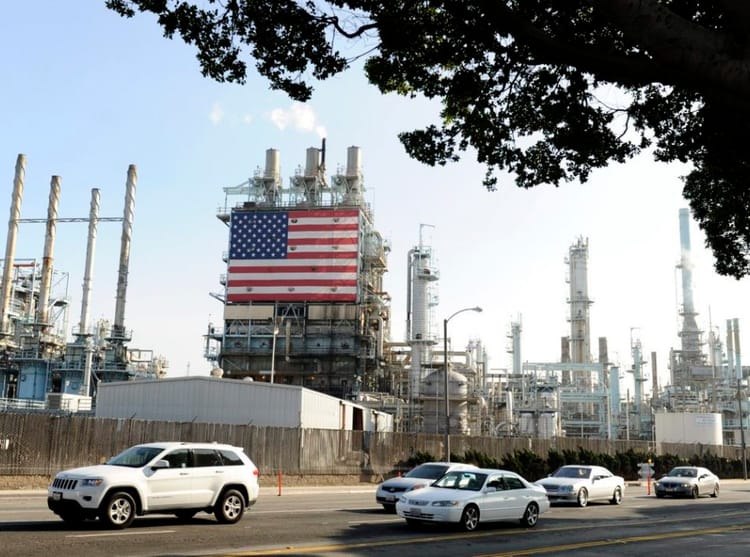How Extractive Industry Won the War Against ESG

This week the Security and Exchange Commission’s long-awaited guidance on climate risk disclosure, or as it’s better known Environmental Social and Governance (ESG) risk indicators, was released. After a two-year attack from extractive industries and the pundits and politicians on their payroll, the SEC caved and left out what are called “Scope 3” emissions.
We’ve talked about this before, but just a quick refresher on Scope 3: Scope 3 emissions are a company's supply chain emissions. So they include everything that goes into making it and using it, both upstream and downstream emissions. That's a big deal for all sorts of polluting industries; the oil and gas folks would rather keep things focused upstream, where they can talk about how they're reducing the "carbon intensity" of pumping oil and ignore what happens when people use their product, while big ag likes to keep things focused downstream where they can point people's attention toward sustainable packaging or reduced shipping emissions and distract them from the heavy methane emissions of dairy, cattle and hog ranches. None of these industries wanted the SEC looking at the part of their supply chain hiding 80 to 90 percent of their emissions.
I must also repeat for the tenth time that ESG was something these industries loved before the SEC threatened to make it real by including Scope 3 emissions. “The SEC coming and saying how much carbon emissions are you really responsible for, not just, you know, what you're claiming you're responsible for, is a really big deal to these companies,” Jesse Coleman, a researcher at Documented, who has spent the past few years tracking the anti-ESG push, told me last year. “If you're an oil company, for example, the SEC asking how much carbon are you actually putting in the atmosphere from everything that you've gotten from underground? What is your real impact? That is a really big deal. It's probably one of the biggest climate policy issues in play right now.”
After delaying its guidance for more than a year, the SEC ultimately bent to the will of extractive industries. And let’s not forget that on top of absolutely failing to adequately act on climate, these guidelines are also a major let down to investors, who have been asking the SEC to require disclosures that actually tell them how prepared various companies are to deal with climate impacts, regulations, and a whole host of related issues. At one of a handful of wildly performative House Oversight Committee hearings on ESG last year during which the phrase “woke capital” was thrown around at least as much as “climate risk disclosure,” Illinois state treasurer Michael Frerichs, pointed to the opioid investigations as a good example of why investors need good ESG guidelines to make smart investments and manage risk. “ESG is about looking at a wider range of risks and value opportunities that can have a material financial impact on investment performance,” he said. “If you’re investing in a pharmaceutical company, it’s thinking about whether that company has exposure to massive lawsuits because of its role in the opioid epidemic.”
To me the war of words over ESG is a really clear example of both how totally out-gamed the climate movement is on communications, narrative and media, and why it’s worth doing better. NGOs and philanthropists are never going to be able to out-spend global oil majors or rogue governments. They’ll never have the lobbying power of an Exxon, Shell or BP, all of which exert control over multiple governments. To go up against that kind of money and power, you need to not only pool as much of the money and power on your side together, but also leverage any less-tangible benefits you may have. For those fighting for climate action, that means appreciating and leveraging things the movement has long ignored or even actively suppressed: diversity and narrative.
If climate folks can continue to learn how to work collectively with other social movements—folks fighting for democracy, for example, which is absolutely critical to delivering climate action— they can grow and strengthen their movement, making it more resistant to attack.
On the narrative front, for decades, climate advocates steered clear of anything as squishy and emotional…dare I say female…as “storytelling.” Talking about climate with any sort of emotion was either scorned or met with fear that it would be used as proof somehow that concerns about climate are not science-based. Like you can’t be scared or angry or sad about the scientific fact that the only planet your species can survive on is being slowly killed. There’s been a lot of progress toward eroding that taboo in recent years, but I still see it crop up in conversations. And there are still very few climate funders focused on things like “narrative change.” If that doesn’t shift, we will continue to see extractive industry drown out climate.
The first step to thinking about narrative change is understanding why the dominant narrative is working for people in the first place. So with that in mind, let’s look at the messaging tactics and strategies that helped oil majors win their war on ESG:
- Fear-mongering One of the stories extractive industry tells best is around how every regulation is a threat to freedom. The reality for the vast majority of citizens—perhaps Elon Musk, Jeff Bezos, Mark Zuckerberg, and Bill Gates excluded—is that more regulation on corporations actually means more freedom for individuals. Conversely, the more freedom corporations have, the more they trample on individual freedoms. But when climate folks deploy fear it's along the lines of "the world is dying;" maybe it needs to be more like they're taking away your choices...an accusation that gets lobbed at climate folks all the time but is actually a more accurate description of pro-business/anti-regulation folks.
- Culture war cliches/leaning into identity politics Something I've been thinking about a lot is how folks in climate orgs and social justice orgs will often caution against calling anything you're criticizing "conservative" or "right-wing." They'll caution against identifying anything climate-related as "progressive" or "left" too, the idea being if you don't call attention to the identity or ideology a particular policy or proposal is affiliated with it will have a better chance of breaking through people's defense. Maybe that's true. But climate obstructionists ignore this rule entirely. Any regulation they don't like is "woke", anything they do like is "pro-business" or "pro-liberty." They're not just not trying to hide who these messages are coming from, they're actively promoting group identity. And look there are lots of reasons why that might work better on the anti-climate than pro-climate side—the right is far more homogenous demographically, for a start, and has spent years emphasizing the benefits of group think and being on the same page, at least publicly. But it's also true that people in general respond better to unvarnished truth than carefully crafted middle-of-the-road statements, designed not to offend anybody. Perhaps it's time climate folks started just...claiming their values?
- Varied spokespeople all singing the same tune. You had investment firms like BlackRock and Vanguard walking back their climate commitments and talking about the dangers of aggressive SEC guidelines; the Texas Public Policy Institute sounding off about "woke capital"; state treasurers organizing to ban ESG in their states; and a broad range of industry spokespeople, from oil and gas to animal ag, sounding the alarm about Scope 3 disclosures being a risk to their industries. It was a broad-based coalition and their message consistency was on point.
- Enabler ecosystem working seamlessly. We talk a lot about PR and advertising here at Drilled, but that's not the only enabler making extractive industry work these days. You've also got lawyers, management consultancies, and lobbyists, and for them to truly do the job of enabling they all have to be in sync. On ESG they operated like a well-oiled machine, with lobbyists from the National Cattleman's Beef Association, American Fuel and Petrochemicals Manufacturers, American Petroleum Institute and more doing their thing on the Hill; the Republican Attorneys General Association coordinating around utterly baseless investigations into whether or not ESG is an "antitrust violation" (the power of RAGA to do such things and make the legal threat feel real enough to scare investment firms and politicians is itself the result of a well-funded, years-long effort too, of course); Exxon filing an unprecedented, highly contentious lawsuit against its shareholders Arjuna Capital and Follow This for asking it to properly disclose emissions; McKinsey doing its particular brand of fear-mongering as thought leadership; politicians like Vivek Ramaswamy echoing the fears around "woke capital"; and the PR and ad folks making sure the idea stuck via media outreach and campaigns.
There are no doubt more that I'm forgetting or have missed altogether; I'm sure someone will send me notes (maybe a few people!). In any case, I'm very curious to see how extractive industries will shift their messaging now, particularly if, as some analysts have predicted, the lack of robust climate risk guidance leads to lower returns for investors. It will be fascinating (and illuminating!) to see how they start to talk about this stuff now that their preferred version of ESG—the one that asks almost nothing of them and helps them use greenwashing to unlock capital—is back in place.
This Week on the Podcast
Next year marks 30 years since the Ogoni 9 were hung, murdered by state- and oil company-backed forces for protesting against the destruction Shell was wreaking on Nigeria. Today, the Ogoni people are still fighting both the oil company and the government, but reporter Ugochi Anyaka-Oluigbo shows us the resistance is as strong as ever.
This Week’s Climate Must-Reads
- [Study] "The animal agriculture industry, US universities, and the obstruction of climate understanding and policy" (by Viveca Morris and Jennifer Jacquet in Climatic Change) - An absolutely fascinating look at animal ag's "Merchants of Doubt" operating in real time today, primarily sewing doubt by wrapping PR in the credibility of university "experts."
- [Report] Artificial Intelligence Threats to Climate Change (Climate Action Against Disinformation) - Led by Friends of the Earth, Check My Ads, Greenpeace, Global Action Plan and Kairos, this report maps out the many ways that unregulated artificial intelligence might exacerbate the climate crisis.
- Behind F1's Velvet Curtain (by Kate Wagner, for...well originally for Road and Track but now picked up by Escape Collective) - This truly excellent piece on F1 was mysteriously deleted moments after it posted to Road & Track's website, despite there being no accusations or even suggestions of factual error in it. Could it possibly be because of F1's oil-tarian sponsor, Saudi Aramco?
- Oil industry has sought to block state backing for green tech since 1960s (by Ajit Niranjan, for The Guardian) - A super important piece to the "they knew, they lied" puzzle: new research showing that not only did oil majors know about the coming climate crisis, suppress that information and lobby against climate action, but also they lobbied against alternative energy technologies for decades.
- Kohei Saito’s “Start From Scratch” Degrowth Communism (by Matt Huber and Leigh Phillips for Jacobin) - A long but worthy read interrogating popular Japanese theorist Kohei Saito's rewrite of Marxist theory arguing that, if taken seriously, Saito's approach "would lead to political disaster for both the socialist left and the environmental movement."
Want to support our work? There's a button for that! Upgrade to a paid subscription today!





